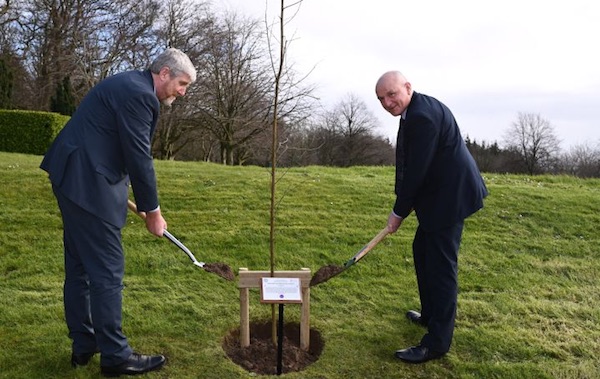
The 32 County Sovereignty Committee has condemned the participation of Sinn Féin in a ceremony at the Belfast Assembly to mark the 70th anniversary of Elizabeth Windsor’s coronation as Queen of England.
The tree-planting event was organised by the Commonwealth Parliamentary Association (CPA), previously known as the Empire Parliamentary Association, an organisation of members of legislatures of the former British Empire. The ceremony was part of a wider celebration for what’s known as Commonwealth Day, formerly Empire Day.
The Sinn Féin Speaker of the Assembly, Alex Maskey, had originally been due to preside over the event but, following a positive test for Covid-19 he had to pull out. However, Sinn Féin’s Chief Whip at Stormont, John O’Dowd (pictured, left), did take part.
Mr Maskey said: “I regret that I was unable to lead this event in person but I am glad that today the Assembly had the opportunity to formally mark Queen Elizabeth’s Platinum Jubilee.
“It is extremely positive that the Assembly Branch of the CPA, the Assembly Commission and all parties have agreed to this initiative and I want to thank them all for their support.”
He said it was “fitting for the Assembly to demonstrate its respect given the significant contribution the Queen has made to political progress here when so much has changed over the last seventy years in our community and the wider world.”
The comments underlined the growing divergence between Sinn Féin and their former republican comrades. The 32 County Sovereignty Movement was particularly scathing of Sinn Féin’s direction of travel.
“For years Sinn Féin have been slowly chipping away at and disowning any semblance of Irish Republicanism and have morphed into a typical British political party, no better than the tories of Westminster or Fine Gael in Leinster House,” they said.
The latest visit of Prince Charles to Ireland takes place later this week in Tipperary, and Sinn Féin politicians may be among the local dignatories Charles will meet.
Windsor remain the colonel-in-chief of the murderous Parachute Regiment, responsible for the Bloody Sunday and Ballmurphy massacres, among others.
His visit to towns in Tipperary has been called “a shameful PR stunt” by republicans there.
While the exact details of the visits have been kept secret in order to deter protests, Saoradh said its members had been preparing their opposition, postering and handing out leaflets in Cashel and Cahir.
“Tens of thousands of taxpayer’s money will be spent on ensuring the security of these royal parasites, while they are escorted around our county,” they said.
“His Regiment were responsible for Bloody Sunday and numerous other murders of men, women and children in Ireland.
“Tipperary has a long and proud tradition of revolutionary Irish Republicanism, from the Young Ireland rebellion of 1848, the Fenian Rising in 1867, through to the first shots in Soloheadbeg in 1919, Tipperary has been to the fore in opposing British influence in Ireland.
“The fact that the Free State establishment would welcome these British royal parasites to the Premier County is shameful and will rightly be opposed.”
Growing resentment over visits of British royals to Ireland is in line with other former British dominions around the world, particularly in the Caribbean, where the royals’ links to slavery and colonial exploitation has come into focus.
In Belize, the Duke and Duchess of Cambridge (Prince William and his wife,) were this week forced to cancel a visit to a farm there due to demonstrations staged by villagers angered by the visit.
Dozens of senior Jamaican officials have also been demanding slavery reparations during a subsequent visit to the island. In an exchange that was caught on camera, the Jamaican Prime Minister Andrew Holness told the royal couple that whilst Jamaicans were “very very happy” to welcome them, “there are issues here which are as you would know unresolved”.
He added that his nation is “moving on” and has “true ambitions” to become an ‘independent, developed, prosperous country’. His comments followed his statement last year that there was “no question” his country would become a republic.
Less than four months ago, another former British colony in the Caribbean, Barbados, official removed the Windsor family as its head of state and became a republic.
![[Irish Republican News]](https://republican-news.org/graphics/title_gifs/rn.gif)
![[Irish Republican News]](https://republican-news.org/graphics/title_gifs/harp.gif)

